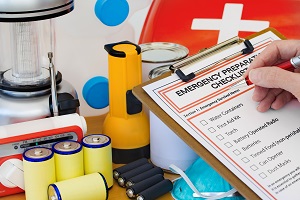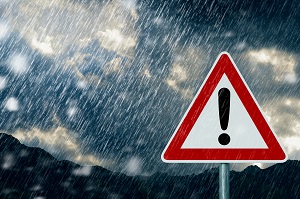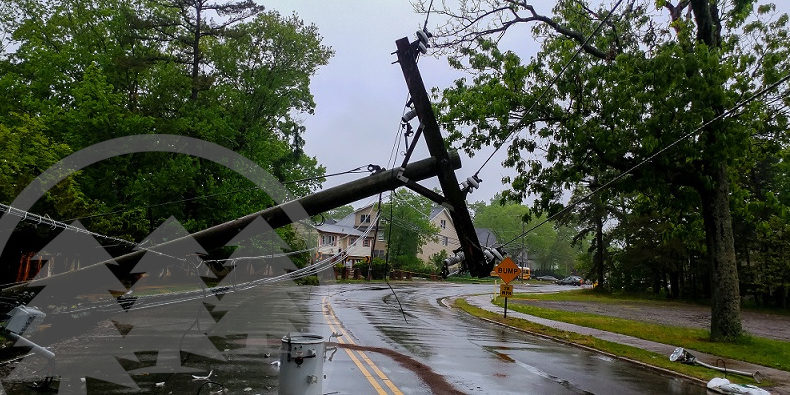Being close to the Atlantic Ocean is part of what makes living in the Carolinas so appealing. The beautiful sites along the coast bring many tourists, boosting the economy and making life for residents more prosperous. However, this proximity comes with its share of bad weather that can cause damage to homes, vehicles, and other personal belongings. So, how can an HOA prepare for bad weather?
How Can Your HOA Prepare for Bad Weather?
For an HOA community, “bad weather” can be more detrimental than it initially seems. Part of caring for an HOA is considering the weather patterns in the area and planning ahead for severe storms and natural disasters.
Among other storms, North and South Carolina has been hit hard by over 50 hurricanes in the past 150 years. Of these storms, 12 of them caused major damage. That isn’t to say that only severe storms are dangerous. In fact, even milder storms can cause significant damage to properties.
Rain can cause water to rise, flooding properties or causing leaks in the ceiling. Wind can cause damage to roofs, and hail can break windows and cause damage to siding and shingles. In addition, the winter months can also have a negative effect on properties, with freezing temperatures causing all sorts of mischief and trouble for homeowners.
Not even the weatherman can always accurately predict weather patterns, so it is crucial to have a game plan in place for your HOA to follow in the event of inclement weather affecting your area. Here are some tips on how to prepare for bad weather:
1. Invest in an Insurance Policy
 One of the first things you should do for the HOA is to purchase insurance. It may seem like the obvious thing to do, but in fact, a lot of HOAs fail to faithfully keep up their insurance policies.
One of the first things you should do for the HOA is to purchase insurance. It may seem like the obvious thing to do, but in fact, a lot of HOAs fail to faithfully keep up their insurance policies.
Some of these associations don’t even have adequate coverage. If you are one of the associations that have let insurance slip by the wayside, now is a great time to update your policy.
2. Prepare the Exteriors
Many HOAs have a “walls out” policy, meaning that everything on the outside of the building is the association’s responsibility, while the inside is the responsibility of the resident. With this in mind, one of the best things you can do for your buildings is to adequately waterproof the outside.
Strong winds can also cause tree branches to fall, potentially resulting in more damage or, worse, injury. Before a storm arrives, make sure to trim the branches and loose limbs to avoid problems. If you have any outdoor furniture, see to it that they are secured to the ground. It may even be better to bring them inside the house so that they aren’t thrown around into the air by a gust of strong wind.
Maintenance is not an area in which to cut corners. Small leaks can turn into major downpours when destructive hail or large amounts of rain are a factor. Save the tight budget for other areas and invest in maintenance and waterproofing that will make your buildings more impervious to bad weather.
3. Have an HOA Emergency Preparedness Plan and Kit
 How can an HOA prepare for bad weather? The most common answer to this question is to have an emergency plan in place. Your HOA must have a clear system on what to do and where to go in times of inclement weather.
How can an HOA prepare for bad weather? The most common answer to this question is to have an emergency plan in place. Your HOA must have a clear system on what to do and where to go in times of inclement weather.
Know where the safest areas are in your community and make sure all homeowners are aware of it as well. In fact, it is a good idea to hold a meeting prior to the storm to discuss and inform residents of the emergency preparedness plan. Copies should be distributed, too.
Apart from a plan, your HOA must have an emergency kit stored on every community property. These kits must contain flashlights, batteries, a radio or walkie-talkie, a first aid kit, non-perishable food, and bottles of water. Encourage homeowners to put together similar kits for themselves, with additional items like extra cash, important documents, and emergency contact numbers.
4. Work with Homeowners
It is equally important to keep up constant communication with residents in your association to help them properly maintain their homes during the summer and winter months. Residents can be a great asset when it comes to winterizing properties to protect against the changes in weather. Steps as simple as running the tap during a severe freeze to keep pipes from bursting can help to prevent some of the damages that would otherwise occur.
Your HOA must also collect or update all contact information, including emergency contact details. This way, your HOA can easily get in touch with residents in times of disorder.
5. Stay Vigilant
 You can’t control the weather. Sometimes, there is nothing else you can do except stay vigilant. Always check for weather updates on your phone. Download any helpful apps that will keep you up-to-date on things.
You can’t control the weather. Sometimes, there is nothing else you can do except stay vigilant. Always check for weather updates on your phone. Download any helpful apps that will keep you up-to-date on things.
Make sure notifications are turned on and are on loud. If your community is located in Charlotte, it is a good idea to have a Google alert set for “severe weather in Charlotte NC.”
Being prepared takes more than just putting together a kit. It involves staying informed. Keep your television or smartphone close by at all times. In case of power interruptions, have a radio handy. Don’t forget to stock up on extra batteries, too!
How Can HOA Prepare for Severe Weather?
No matter where you live in the United States, the weather will be a constant battle. It is important to do what you can to protect your association from the elements and to give your residents a safe and comfortable place to live.
So, how can your HOA prepare for bad weather? Aside from having proper insurance coverage, you must make sure your exteriors are physically prepared to handle the brunt of severe weather. Have a well-thought-out HOA emergency preparedness plan in place as well as fully-stocked emergency kits for everyone. Work with homeowners in property maintenance and have an open line of communication. Most of all, you must stay alert.
If you need help preparing your HOA for bad weather, consider contacting an HOA management company. In that case, don’t hesitate to shoot us a message.
RELATED ARTICLES:
- How To Have An HOA Natural Disaster Preparation Plan In Place
- If A Tree Falls On A House, Who Is Responsible?
- When An HOA Resident Dies, What Do You Do?






